Montenegro and Albania awaiting to receive a status of candidate countries
Evelyna Topalova, December 8, 2010
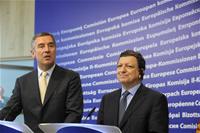 When in 2006 Montenegro declared independence, one of its arguments for leaving the union with Serbia was that Belgrade was hampering its EU integration process as Serbia fails to prove it was co-operating fully with the UN war crimes tribunal, namely to arrest Bosnian Serb wartime leader Ratko Mladic. Four years later, Montenegro is close to receiving an EU candidate status while Serbia's membership application is still under review.
When in 2006 Montenegro declared independence, one of its arguments for leaving the union with Serbia was that Belgrade was hampering its EU integration process as Serbia fails to prove it was co-operating fully with the UN war crimes tribunal, namely to arrest Bosnian Serb wartime leader Ratko Mladic. Four years later, Montenegro is close to receiving an EU candidate status while Serbia's membership application is still under review.
Representatives of Montenegro and the EU are implying more and more that the country could get the candidate status at the upcoming EU summit scheduled for December 16-17. There are grounds for such an optimism as the European Commission in its opinion on Montenegro's application published in November gave a positive assessment and recommended granting a status.
The Commission estimates that Montenegro has made progress in meeting the political and economic criteria. The key word in the report however is "reforms".
In order to advance to the next stage of its EU integration process, the country 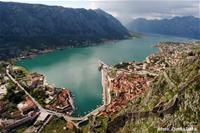 should exert more efforts in reforming the judiciary, the fight against corruption and organised crime, to strengthen public administration's capacity. The recommendations in this area are similar to those of Croatia which is now on the final leg of the accession process. Montenegro will have to do more in aligning with the acquis and to implement it effectively in fields as freedom of movement for workers, free movement of services and capital, public procurement, information society and media, transport policy, energy, etc.
should exert more efforts in reforming the judiciary, the fight against corruption and organised crime, to strengthen public administration's capacity. The recommendations in this area are similar to those of Croatia which is now on the final leg of the accession process. Montenegro will have to do more in aligning with the acquis and to implement it effectively in fields as freedom of movement for workers, free movement of services and capital, public procurement, information society and media, transport policy, energy, etc.
The Commission considers that the shortcomings in implementation of the legislation persist. The public administration remains weak and highly politicised, according to the report. The EC's concerns are related to "politicisation of the judiciary and shortcomings in the functioning of law enforcement institutions, in particular in fighting organised crime and corruption."
The report notes that the country cooperates in an active way and plays constructive role in regional initiatives and maintains good neighbourly relations.
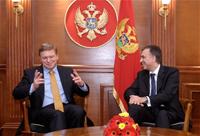 The European Commission says accession talks with Montenegro could start once the country has met all political criteria related to stability of institutions and rule of law. Among the priorities areas are improvement of legislative framework for elections according to OSCE recommendations and the Venice Commission, boosting the role of Parliament, strengthening rule of law, particularly when it comes to appointment of free of political influence and skilled people, guaranteeing independence of judges and prosecutors. The Commission insists also on improvement of anti-corruption legislation and strengthening the fight against organised crime.
The European Commission says accession talks with Montenegro could start once the country has met all political criteria related to stability of institutions and rule of law. Among the priorities areas are improvement of legislative framework for elections according to OSCE recommendations and the Venice Commission, boosting the role of Parliament, strengthening rule of law, particularly when it comes to appointment of free of political influence and skilled people, guaranteeing independence of judges and prosecutors. The Commission insists also on improvement of anti-corruption legislation and strengthening the fight against organised crime.
And while ordinary people and officials have had reasons to celebrate after the EC's opinion on Montenegro's application, in Albania the mood was much more pessimistic.
Having reviewed Albania's EU membership application, the EC has concluded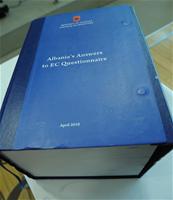 that the country should exert more efforts and implement more reforms in order to get an EU candidate status. The country is facing a political stalemate since June 2009 after the opposition boycotted the parliament insisting on a thorough investigation of the parliamentary elections which they claim were marred by frauds. The main opposition Socialist Party has been refusing for months to take their seats in Parliament until an investigation is carried out. This has blocked the adoption of key laws related to the country's EU integration.
that the country should exert more efforts and implement more reforms in order to get an EU candidate status. The country is facing a political stalemate since June 2009 after the opposition boycotted the parliament insisting on a thorough investigation of the parliamentary elections which they claim were marred by frauds. The main opposition Socialist Party has been refusing for months to take their seats in Parliament until an investigation is carried out. This has blocked the adoption of key laws related to the country's EU integration.
Albania submitted its EU membership application on April 28th 2009, four months after Montenegro. Despite broad public and political consensus on EU integration being a priority, political parties have failed to overcome their disagreements in the past year so that they could work together towards meeting this goal. The political dialogue is nonconstructive and confrontational which obstructs parliamentary work and prevents passing of necessary political reforms, the report reads and calls on Albania to ensure the proper functioning of Parliament.
Although international observers have assessed that parliamentary elections had met most international standards, they have found some shortcomings and made recommendations for future elections. The Commission advises Albania to proceed with an electoral reform that would improve the elections process.
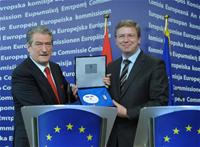 The report notes that in recent years Albania has achieved progress in strengthening the rule of law by implementing legislative and institutional reforms in the judiciary and the fight against corruption and organised crime. The document, however, says substantial shortcomings regarding the independence and effectiveness of the judicial system persist. Serious concerns raises corruption, in particular in the judiciary, the healthcare system and cases related to compensation of property rights. The Commission estimates that lack of transparency in political parties' funding remains a serious problem. As far as economic criteria are concerned the Commission says that the country has achieved a certain degree of macroeconomic stability.
The report notes that in recent years Albania has achieved progress in strengthening the rule of law by implementing legislative and institutional reforms in the judiciary and the fight against corruption and organised crime. The document, however, says substantial shortcomings regarding the independence and effectiveness of the judicial system persist. Serious concerns raises corruption, in particular in the judiciary, the healthcare system and cases related to compensation of property rights. The Commission estimates that lack of transparency in political parties' funding remains a serious problem. As far as economic criteria are concerned the Commission says that the country has achieved a certain degree of macroeconomic stability.
Tirana, as well as Montenegro, has been playing a constructive role in regional cooperation and its relations with neighbours are generally good.
To summarize we could say that both countries have achieved a lot in the past 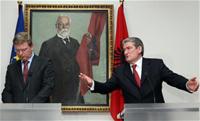 year but not enough and they should keep on implementing reforms in order to prove that they are ready for membership in the EU. Montenegro could outrun Albania by receiving an EU candidate status but this would not guarantee a start of accession talks. Remember that Macedonia has received such a status in 2005 but is still waiting in the antechamber.
year but not enough and they should keep on implementing reforms in order to prove that they are ready for membership in the EU. Montenegro could outrun Albania by receiving an EU candidate status but this would not guarantee a start of accession talks. Remember that Macedonia has received such a status in 2005 but is still waiting in the antechamber.
 Bakir Izetbegovic, Andrej Plenkovic | © Council of the EU
Bakir Izetbegovic, Andrej Plenkovic | © Council of the EU Aleksandar Vucic, Recep Tayyip Erdogan | © Serbian Presidency
Aleksandar Vucic, Recep Tayyip Erdogan | © Serbian Presidency Jean-Claude Juncker, Zoran Zaev | © European Commission
Jean-Claude Juncker, Zoran Zaev | © European Commission